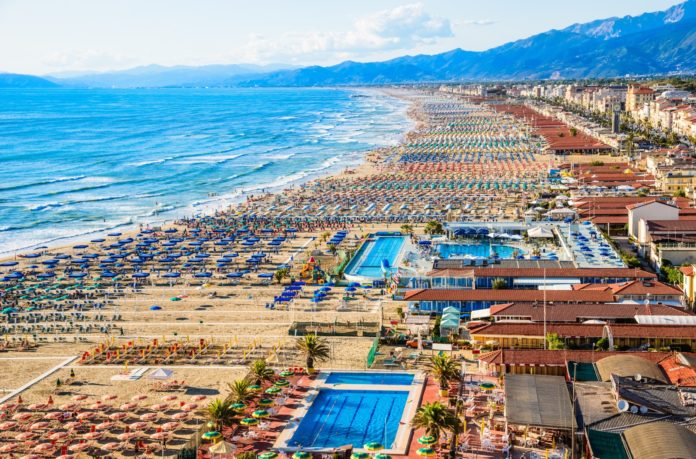
by Riccardo Cacelli
Londra – For years with Cacelli Group Ltd we have been following the evolution of the Italian seaside sector in relation to the European Bolkentstein directive.
Finally we see the light at the end of the tunnel and we can start thinking about investing in Italy in the seaside sector which represents a very important resource for Italian tourism.
In Italy these days, after years of freezing, the Bolkenstein directive is being adopted for beach establishments.
WHAT BOLKENSTEIN IS
It’s known as the Bolkestein Directive, the European Union directive, 2006/123/EC, relating to services in the common European market, presented by the European Commission in February 2004, approved and issued in 2006.
It was said so by Frits Bolkestein, European commissioner for the internal market of the Prodi Commission, as he oversaw and supported this directive.
The directive is based on articles 47.2 and 55 of the Treaty of the European Community and is organized into three areas, concerning: the elimination of obstacles to freedom of establishment; the elimination of obstacles to the free movement of services; the establishment of mutual trust between member states.
The directive was implemented in Italy through the legislative decree of 26 March 2010, n. 59. Given the intense lobbying activity of operators in the seaside sector, Italy has never proceeded with its implementation.
In 2020, the European Union opened a procedure against Italy as it believed that the authorisations, the number of which is limited due to the scarcity of natural resources (for example beaches), must be issued for a limited period and through a procedure of open, public selection based on non-discriminatory, transparent and objective criteria.
Previously, in 2016, the Court of Justice of the European Union had ruled that the relevant legislation and the practice existing at that time in Italy of automatically extending existing authorizations of beach concessions were incompatible with Union law.
Last October, the European Commission called on Italy for the umpteenth time to adapt the legislation on beach concessions. In the letter he gives two months to adapt, he also criticizes the results of the technical table set up by the Italian government (result: the share of areas occupied by the concessions is equivalent to 33% of the available areas.
A percentage which for the government and for the seaside resort associations represents the demonstration that the resource is not “scarce” and that therefore the beaches do not fall under the obligation to tender concessions provided for by the Bolkestein directive) which would demonstrate that the beaches would not be “scarce” to free them from the obligation of tenders provided for by the Bolkestein Directive.
Italy is asked again to comply with EU law and is urged to say what it intends to do to this end within two months.
The Commission may then decide to appeal to the Court of Justice of the European Union. For the EU, that result “does not reflect a qualitative assessment of the areas in which it is actually possible to provide beach concession services” and “does not take into account specific situations at regional and municipal level”.
“We have issued the reasoned opinion. Now the Italian authorities have two months to take the necessary measures to provide us with the answers. And then we will decide on the next steps. The correct application of community law is always our top priority, but we always prefer agree with the member states rather than having to take them to the Court. And once again this is not a procedure to take Italy to court. It is the reasoned opinion. And this does not prejudice the continuation of the negotiations we have with the Italian authorities“ , confirmed the European Commission’s spokeswoman for the Internal Market, Johanna Bernsel.
“Member States – added Bernsel – are required to ensure that authorisations, the number of which is limited due to the scarcity of natural resources (for example beaches), are issued for a limited period and through an open selection procedure , public and based on non-discriminatory, transparent and objective criteria” The aim is to “provide all interested service providers – current and future – with the opportunity to compete for access to these limited resources, to promote innovation and fair competition and to offer benefits to consumers and businesses, while protecting at the same time citizens from the risk of monopolization of these resources“, the Commission already argued then.
Last November 9, the Italian Council of State established that the mrtime (seaside) state concessions for tourist-recreational purposes currently in place will only be valid until December 31, 2023.
The decision finds its raison d’être in the need to guarantee citizens management of the national coastal heritage and a related offer of more efficient, better quality and safer public services, with the consequent benefit of economic growth and, above all, recovery. of the investments the country needs.
Therefore, starting from 1 January 2024, existing state concessions will be, so to speak, “cancelled” – regardless of whether or not there is a person taking over the concession. In the meantime, the Government and Parliament will have to work to approve legislation that regulates the release of state concessions in compliance with the dictates of European law, which provides for the adoption of impartial and transparent procedures, with the issuing of authorizations of limited duration and not automatically renewable.
It follows that, starting from 1 January 2024, the concessions will be re-awarded following the completion of tender procedures in which the current concessionaires will also be able to participate, without prejudice to the possibility that the plant they have looked after perhaps for decades will be given up concession to some other participant.
BUSINESS DATA
In Italy there are 5,271 beaches in Italy, covering a total area of 123,765,883 square meters.
Of these, 27,968,491 square meters were allocated to concessions for “Recreational Tourist” use, representing approximately 23% of the total beaches.
According to a study by Nomisma, there are 6,592 Italian beach establishments, employ around 60,000 workers (of which 43,000 employees, around 6.5 per company) and have an average turnover of 260,000 euros per year per company.
All state-owned maritime (seaside) concessions number 26,313, of which 15,414 are for tourist-recreational use (i.e. the typology that includes concessions for beach establishments).
As regards the number of bathing establishments at a regional level, here is the list:
- Emilia-Romagna with 969 companies (14.7% of the total)
- Tuscany with 850 (12.9%)
- Liguria with 753 (11.4%)
- Campania with 645 (9.8%)
- Calabria with 578 (8.8%)
Lazio with 513 (7.8%).
69% of beach establishment owners are men and the prevalent age is between 40 and 64 years (68%).
One dealer in ten is under 39 years of age and only two dealers in ten have a degree, while the prevalent qualification is a high school diploma (62%).
Turnover and investments
On a sample of 500 seaside businesses, located along the entire Italian coast, the average turnover is around 260,000 euros per year per seaside business, 50% generated by “traditional services”, i.e. beach, parking and rental of equipment (sunbeds , umbrellas and cabins).
48% comes from bar and restaurant revenues.
60% of the factories have purchased equipment and furnishings, and 50% have invested in removable structures.
In 93% of cases the beach services were improved, in 85% the bar, in 70% the restaurant and in 50% the area intended for children.
Italian beach businesses are extremely dynamic: at least one in three has introduced new services since 2000.
If in the nineties those relating to entertainment were added (37%), sports activities (30%).
Since 2000 those for catering (50%), entertainment (45%), sports equipment (39%) have been added or expanded. ) and rental (37%), with in addition spaces related to wellness and commercial services.
The services are mainly managed directly, since the car park and restaurant are entrusted to third parties in 20% of cases.
 CACELLI GROUP FOR INVESTOR
CACELLI GROUP FOR INVESTOR
In addition to its activity as a strategic business consultant, Cacelli Group Ltd has a series of international partnerships (architects, surveyors, financial experts, territorial and local observatories, etc.).
With this cooperation it is able to help the investor in choosing the ideal nation among France, Spain, Portugal, Croatia, Greece and of course Italy and draw up the appropriate economic, planning and financial instruments.
It is complete, integrated and useful consultancy.
Anyone who wishes can write a private and confidential email to: r.cacelli@cacelli.com
Sono anni che con la Cacelli Group Ltd stiamo seguendo l’evoluzione del settore balneare italiano in relazione alla direttiva europea Bolkentstein.
Finalmente si vede la luce in fondo al tunnel e si puo’ inziare a pensare di investire in Italia nel settore balneare che rappresenta per il turismo italiano una importnatissima risorsa.
In Italia in questi giorni sta adottando, dopo anni di congelamento, agli stabilimenti balneari la direttiva Bolkenstein.
VEDIAMO COSA E’ LA BOLKENSTEIN
E’ conosciuta come Direttiva Bolkestein, la direttiva dell’Unione Europea, 2006/123/CE, relativa ai servizi nel mercato europeo comune, presentata dalla Commissione europea nel febbraio 2004, approvata ed emanata nel 2006.
Venne così detta da Frits Bolkestein, commissario europeo per il mercato interno della Commissione Prodi, in quanto ha curato e sostenuto questa direttiva.
La direttiva è basata sugli articoli 47.2 e 55 del Trattato della Comunità europea ed è organizzata su tre ambiti, concernenti:
- l’eliminazione degli ostacoli alla libertà di stabilimento;
- l’eliminazione degli ostacoli alla libera circolazione dei servizi;
- l’instaurazione della fiducia reciproca tra stati membri.
Alla direttiva è stata data attuazione in Italia mediante il decreto legislativo 26 marzo 2010, n. 59.
Considerata l’intensa attivita’ lobbistica degli operatori del settore balneare l’Italia non ha mai proceduto alla sua attuazione.
Nel 2020 L’Unione Europea apre una procedura contro l’Italia in quanto riteneva che le autorizzazioni, il cui numero è limitato per via della scarsità delle risorse naturali (ad esempio le spiagge), devono essere rilasciate per un periodo limitato e mediante una procedura di selezione aperta, pubblica e basata su criteri non discriminatori, trasparenti e oggettivi.
In precedenza, nel 2016, la Corte di giustizia dell’Unione europea aveva stabilito che la normativa pertinente e la pratica esistente a quel tempo in Italia di prorogare automaticamente le autorizzazioni vigenti delle concessioni balneari erano incompatibili con il diritto dell’Unione.
Nell’ottobre scorso la Commissione Europea ha richiamato per l’ennesima volta l’Italia ad adeguare la normativa sulle concessioni balneari. Nella lettera dà tempo due mesi per adeguarsi, critica anche gli esiti del tavolo tecnico disposto dal governo italiano (esito: la quota di aree occupate dalle concessioni equivale al 33% delle aree disponibili. Una percentuale che per il governo e per le associazioni dei balneari rappresenta la dimostrazione che la risorsa non è “scarsa” e che quindi le spiagge non ricadono sotto l’obbligo di mettere a gara le concessioni previsto dalla direttiva Bolkestein) che dimostrerebbero come le spiagge non sarebbero “scarse” per svincolarle dall’obbligo delle gare previste dalla direttiva Bolkestein.
All’Italia viene chiesto nuovamente di conformarsi al diritto comunitario e viene sollecitata a dire cosa intende fare a tal fine entro due mesi.
Dopodiché la Commissione può decidere di rivolgersi alla Corte di giustizia dell’Unione europea.
Per l’Ue quel risultato «non riflette una valutazione qualitativa delle aree in cui è effettivamente possibile fornire servizi di concessione balneare» e «non tiene conto delle situazioni specifiche a livello regionale e comunale».
“Abbiamo emesso il parere motivato. Ora le autorità italiane hanno due mesi di tempo per adottare le misure necessarie per fornirci le risposte. E poi decideremo i prossimi passi. La corretta applicazione del diritto comunitario è sempre la nostra massima priorità, ma preferiamo sempre anche concordare con gli Stati membri piuttosto che doverli portare alla Corte. E ancora una volta non si tratta di una procedura per portare l’Italia in tribunale. È il parere motivato. E ciò non pregiudica il proseguimento delle trattative che abbiamo con le autorità italiane“, ha confermato la portavoce della Commissione europea per il Mercato interno, Johanna Bernsel.
“Gli Stati membri – ha aggunto la Bernsel – sono tenuti a garantire che le autorizzazioni, il cui numero è limitato per via della scarsità delle risorse naturali (ad esempio le spiagge), siano rilasciate per un periodo limitato e mediante una procedura di selezione aperta, pubblica e basata su criteri non discriminatori, trasparenti e oggettivi”
L’obiettivo è “fornire a tutti i prestatori di servizi interessati – attuali e futuri – la possibilità di competere per l’accesso a tali risorse limitate, di promuovere l’innovazione e la concorrenza leale e offrire vantaggi ai consumatori e alle imprese, proteggendo nel contempo i cittadini dal rischio di monopolizzazione di tali risorse“, sosteneva già allora la Commissione.
Il 9 novembre scorso, il Consiglio di Stato ha stabilito che le concessioni demaniali marittime per finalità turistico-ricreative attualmente in essere saranno valide solo fino al 31 dicembre 2023.
Secondo i Giudici, infatti, le proroghe automatiche e generalizzate delle concessioni sono contrarie alle regole di concorrenza europee rendendo estremamente difficoltoso l’accesso al settore da parte di altri nuovi operatori.
La decisione trova la sua ragion d’essere nell’esigenza di garantire ai cittadini una gestione del patrimonio nazionale costiero e una correlata offerta di servizi pubblici più efficiente e di migliore qualità e sicurezza, con conseguente beneficio della crescita economica e, soprattutto, della ripresa degli investimenti di cui il Paese necessita.
Quindi a partire dal 1 gennaio 2024, le concessioni demaniali in essere verranno, per così dire, “annullate” – indipendentemente che vi sia o meno un soggetto subentrante nella concessione.
Nel frattempo il Governo e il Parlamento dovranno adoperarsi per approvare una normativa che disciplini il rilascio delle concessioni demaniali in ottemperanza ai dettami del diritto europeo, che prevede l’adozione di procedure imparziali e trasparenti, con rilascio di autorizzazioni di durata limitata e non rinnovabili automaticamente.
Ne consegue che, a partire dal 1 gennaio 2024, le concessioni verranno ri-attribuite a seguito dell’espletamento di procedure di gara cui potranno partecipare anche gli attuali concessionari, ferma restando la possibilità che quello stabilimento che hanno curato magari per decenni venga dato in concessione a qualche altro partecipante.
LE DIMENSIONI DEL BUSINESS
In Italia ci sono 5.271 spiagge in Italia, coprendo complessivamente una superficie di 123.765.883 metri quadrati. Di queste, 27.968.491 metri quadrati sono state destinate a concessioni ad uso “Turistico Ricreativo”, rappresentando circa il 23% del totale delle spiagge.
Secondo uno studio di Nomisma gli stabilimenti balneari italiani sono 6.592, occupano circa 60.000 addetti (di cui 43.000 dipendenti, circa 6,5 per impresa) e hanno un fatturato medio di 260.000 euro all’anno per azienda.
Tutte le concessioni demaniali marittime sono 26.313, di cui 15.414 a uso turistico-ricreativo (ovvero la tipologia in cui rientrano le concessioni degli stabilimenti balneari). Se si tiene conto che il numero di imprese balneari registrate alla Camera di commercio e confermate da Nomisma è di 6.592, ciò significa che ogni stabilimento occupa in media 2,3 concessioni demaniali.
Il 72,3% non supera i 3.000 metri quadri e il 94,9% è inferiore a 10.000 metri quadri.
Per quanto riguarda il numero degli stabilimenti balneari a livello regionale ecco la lista:
- Emilia-Romagna con 969 imprese (il 14,7% del totale)
- Toscana con 850 (12,9%)
- Liguria con 753 (11,4%)
- Campania con 645 (9,8%)
- Calabria con 578 (8,8%)
- Lazio con 513 (7,8%).
Alla luce di quanto sta avvenendo in Italia sono a disposizione di tutti i potenziali investitori/imprenditori italiani ed internazionali per fornire una consulenza professionale per investire nel settore turistico balneare nel Paese europeo con 7.914 km di coste. oltre alle bellezze naturali, storiche e culturali universalmente riconosciute.
La Cacelli Group srl oltre alla propria attivita’ di consulente strategica d’affari ha una serie di partnership internazionali (architetti, geometri, esperti di finanza, osservatori territoriali e locali, etc.) attraverso i quali e’ in grado di aiutare l’investitore nello scegliere la nazione ideale tra Francia, Spagna, Portogallo, Croazia, Grecia e naturalmente l’Italia, e redigere gli opportuni strumenti economici, progettuali e finanziari.
E’ una consulenza completa, integrata ed utile.
Chi lo desidera puo’ scrivere una email riservata e confidenziale a: r.cacelli@cacelli.com
Riccardo Cacelli



